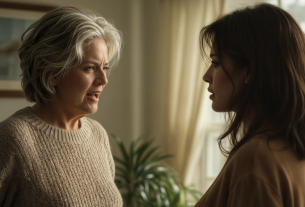You’re making that sour face again. Maybe you should see a gastroenterologist?” Maria smirked without even turning around. She was chopping onions for the salad, but her hand trembled, and the knife hit the wooden board with a dull thud.
“Did you even hear what I said?” Alexey came closer and placed his palms on the table. They were just as limp as his attempts to seem decisive.
“What now?” Maria wiped her hands on a towel and turned around. “Don’t tell me you need another ‘small amount’ for your mommy again.”
“Well, yes. Small. Fifteen thousand. She…”
“Does she need money for her nails? Or does she urgently need to go to Sochi to ‘recover from stress’?” Maria crossed her arms. There was no malice in her voice, only exhaustion. The kind that clings to you like the smell of old oil on a kitchen curtain.
“She has a loan! She… she can’t pay it!” Alexey flared up like a candle in the wind.
“She took it herself. Let her pay it herself. I’m not her ATM, and you’re not her nanny. And if you’re okay being stuck between two women — congratulations, you’ve got a new job: ‘between a hammer and a rolling pin.’”
“You don’t understand. She’s my mom. She…”
“And me? Who am I? Just a convenient ATM with a good credit history?” Maria stepped closer. “I’ve been working two jobs since January, remember? I’m saving up for a car. For my own dream. Not so your mom can go shopping at the mall with a new purse.”
Alexey sat down at the table and pressed his palms to his face.
“You’re cruel, Masha. She’s sixty years old.”
“Uh-huh. And she behaves like a sixteen-year-old whose daddy buys her everything. And by the way, ‘she’s sixty’ is no excuse to order sushi every night and then complain, ‘the interest keeps piling up again.’”
“Well, she has a hard life…”
“Alexey, you’re an adult ass with a passport. You’re married. You live in an apartment you haven’t paid a penny for. And you sit in the kitchen telling me your mom is ‘a poor thing,’ so what does that make me? A witch with a cash register?”
He stood up abruptly.
“So it begins. Again. You should look at yourself. Everything is about ‘have to,’ everything’s on schedule. Even sex — on Tuesdays.”
“Uh-huh, and only if your mom doesn’t call with an ‘important question.’ Last time she sent you a link for a vacuum cleaner.”
“Because hers broke down!” he shouted.
Suddenly Maria laughed. Not with joy — with helplessness.
“Tell me honestly. Did you marry me or her?”
He was silent.
Silence had long been the universal answer in their family.
Maria turned to the stove. The kettle had long boiled. Steam curled under the ceiling like all their fights — unbearably hot and hard to breathe.
“I won’t give her any money, Lyosh. Not fifteen, not five. Zero. Everything I’m saving is for the car. I’m tired of riding the bus after a night shift and listening to someone spit in my ear.”
“That’s selfishness,” Alexey said more quietly.
“No. That’s maturity. Selfishness is when a grown woman takes out loans for cosmetics, knowing her son will ask his wife to pay the debts.”
He stood in the middle of the kitchen like a man who had lost something very important. But the loss was not a thing. The loss was in his face. In his eyes.
“And what if I still give her the money?” His voice was quiet, as if asking, “Will you leave me then?”
“Then pack your things and go to her. You don’t even have to call. Just leave.”
He didn’t answer. Just pressed his lips as if he wanted to say something, then changed his mind. Or understood it would only get worse.
That evening he slept on the couch in the living room. She — in the bedroom. Between them wasn’t a door. Between them was an abyss. Of resentment, debts, and women’s dreams that never got a chance.
For the first time in six years of marriage, she didn’t set an alarm for the night. Let tomorrow begin without a plan.
Alexey lay quietly on the couch, staring at the ceiling. The phone blinked on the nightstand. A message from “Mommy”:
“How’s Masha? Still not dead from anger?”
He didn’t answer. But his fingers trembled.
Because for the first time in six years, he understood what the real debt was. And to whom he owed it.
Saturday began with Alexey trying to cook porridge.
And in the end, he cooked what Maria would call “sticky plaster for walling.” She didn’t leave the bedroom. Just lay there, staring at the ceiling as if waiting for a hint to appear: “how to live with a man who fears his own mother more than the tax office.”
Alexey paced near the door like a guilty schoolboy.
“Maria…” he called hesitantly, opening the door slightly. “I made… breakfast. Want some?”
“If you put your arguments in it — no,” she answered calmly without turning.
He sighed and sat on the edge of the bed. Morning light filtered into the room, so gray it felt like the sky owed again.
“Listen. You do understand… Mom’s in trouble. She really has it bad.”
“She has ‘it bad’ every time I have a dream,” Maria turned and sat on the bed, elbows on her knees. “Did you notice? As soon as I start planning something — Elena Petrovna has a tooth problem, or the bank, or depression, all timed perfectly so I start thinking: she’s getting my texts from the bank.”
“You’re exaggerating,” Alexey frowned.
“Exaggerating? Let’s recall. Two years ago I was saving for courses — she got sick. Six months ago I wanted to start a business — her fridge burned out. And now I want to buy a car, and what? Again, poor, unfortunate victim of capitalism. With a debt her son somehow has to pay. That means me.”
“It’s not that simple,” he mumbled. “She really has no one except us.”
“She has no one because she burned everyone in the emotional crematorium,” Maria went to the window. “Her friends ran away because listening to her about her golden son is impossible without sedatives. Relatives disappeared because, forgive me, she stole other people’s raspberry bushes from the dacha ‘for cuttings.’ And you still believe she’s poor and unfortunate.”
“You don’t understand!” Alexey snapped. “She raised me alone! Alone, you know? Without help! Without a man! She worked hard!”
“And now she thinks she’s entitled for life,” Maria stepped closer, her voice hardening. “And who am I? An extra account in her bank?”
“You’re wrong,” he exhaled.
“No, Lyosh. You’re wrong. You’re not a husband. You’re a courier. Delivering money and excuses. I don’t want to live like this. I shouldn’t live like the second woman in the house. The woman of your life should be one. But you have two. Only one’s in the bedroom, the other on the phone.”
“Are you giving an ultimatum?”
“I’m putting a period, Lyosh. I’m not against helping. But when your mother pretends her problems are more important than ours, and you participate in it, I’m not a wife. I’m a statistic.”
Alexey sat, looking down. He wasn’t angry. He was… weak. That’s how he grew up. His mother decided everything for him. Then Maria. He just drifted. And now — he was sinking.
“I… I’ll talk to her,” he finally said.
“It’s too late,” Maria spread her hands. “I already said — I won’t give a single kopek. And you know, if after all this you send her money — I’ll understand everything.”
He nodded heavily as if a bag of sins had been hung around his neck. Got up and went to the hallway. Put on shoes.
“I’ll go to her. Talk. Maybe… somehow explain.”
Maria didn’t answer. Just watched him button his jacket. Slowly, awkwardly. Like a man who first realized: you can’t sit on two chairs any longer.
Alexey arrived at his mother’s around noon. Khrushchyovka building. Second floor. The smell of cats and boiled onions was already in the stairwell.
“Oh, you showed up,” Elena Petrovna greeted him in a colorful robe, curlers in her hair, lipstick. Red. Like her confidence in being right.
“Mom, we need to talk,” he started immediately, without taking off his coat.
“What, Masha yelled at you again… oh, sorry, ‘Maria’? Must be. So cultured. By the way, I wasn’t rude to her. She’s the one humiliating you.”
“Mom. Enough. I can’t keep begging my wife for money because you’re always in debt.”
“And who’s your wife? Your savior? I don’t care. She’d even take your socks if she could!”
“Mom. I’m serious.”
“I’m not! I gave you my life! And now you crawl before this… this… whining snake?!”
He looked at her like a stranger. She yelled, screamed, threatened — as usual. But now he heard only an echo in her voice. Empty, irritated, powerless.
“I won’t give you any money.” He said it quietly but firmly. “And I won’t ask Masha either.”
Mother fell silent. For a moment.
Then slapped him on the cheek. Not hard. But not playfully.
“Pathetic. Henpecked,” she hissed.
Alexey silently turned and left.
And for the first time in his life, didn’t look back.
He came home when it was already dark. Maria sat at the table with a cup of tea.
He took off his jacket and approached.
“I didn’t give her money,” he said simply.
“And she kicked you out?” Maria asked without emotion.
“Yes.”
“Well then,” she stood up. “Welcome to adult life.”
He looked at her as if for the first time.
As if all this time she stood at the other end of the room, in the shadows. And now — stepped into the light.
“I want to change everything,” he said.
“Then start with yourself, Lyosh. Not with your mother’s debts.”
And she went to the bedroom.
He stayed in the kitchen. Alone with the silence.
This time, it wasn’t angry. Just honest.
Sunday. Maria woke up early. The house smelled of coffee and fresh bread — Lyosha was trying. Trying quietly, carefully, as if afraid to disturb the fragile truce they’d signed yesterday without words.
He put a cup in front of her.
“With sugar. The way you like it.”
She looked at him. He seemed like a stranger. Not the one she shared everyday life, shopping, and endless talks about the dollar exchange rate with. This man stood before her with the eyes of someone who first stepped out of his mother’s shadow.
“I’ll go to Igor today,” he said. “I want to find out if he can help with mom’s loan. At least with advice. I won’t give her money. But we need to understand how she can get out of this.”
“Why?” Maria put down the cup. “She’s an adult. She made this mess — let her clean it up. That’s adult life.”
“Well, I can’t just abandon her…”
“I can.” She stood up. “Because I’m not thirteen, and I don’t have to earn anyone’s approval, especially a woman’s. Neither your mom’s, nor the downstairs neighbor’s, nor even yours.”
He was silent.
Maria stepped closer:
“I’m so tired of being third in your life. You belong to your mom. You always did. Even on our honeymoon you called her three times a day.”
“I understand…” he whispered.
“No, Lyosh. You don’t. You’re afraid. More than you love. And I won’t be with a man who’s afraid anymore.”
He sat down. Put his hands on his knees. His shoulders dropped.
“I don’t want to lose you.”
“And I don’t want to lose myself.” Maria took her jacket from the hanger. “I’m moving out.”
“Where?”
“To my own place.”
He didn’t ask any more questions. And it was the first time. No offense, no reproach. Just nodded. He understood.
A week later Maria rented a one-room apartment near the metro. No renovations, but with courtyard-facing windows and freedom. The first days she drank tea from a disposable cup and slept on a mattress. But she felt better than she had in the last two years.
Lyosha wrote. Calmly. Without hysterics.
“I’m working with a psychologist. I want to figure things out. I don’t know what will happen. But I want to be better.”
She didn’t reply immediately. She thought.
Elena Petrovna also wrote. A whole essay about how Masha destroyed her son, took away his masculinity, and anyway — this generation is selfish. At the end was a postscript:
“Live however you want. But don’t think I’ll forget.”
Maria smiled.
And didn’t answer. Because she owed nothing.
Two months later she came to the store for light bulbs. By the entrance — Alexey. Flowers in his hands. Not roses. Simple wildflowers, wrapped in paper.
“Hi,” he said. “I just… wanted to say thank you.”
“For what?” she was surprised.
“For choosing yourself. Because if it weren’t for that, I’d still be mommy’s boy. But now…”
He fell silent.
“Now who are you?” she squinted in the sun.
“Now I’m learning to be a man. Without mom. Without rescuers. Just… myself.”
“Well, good luck, Lyosh.” She nodded at the flowers. “Just not to me. Give them to yourself. For courage.”
And she walked away. Light bulbs, receipt, bag.
And inside — light. Without mom’s debts, without other people’s dramas. Just her.
The very one who once didn’t have enough air.
Now — she breathes.



